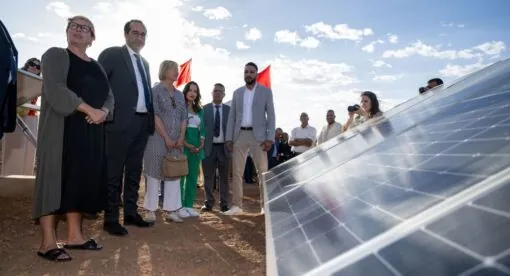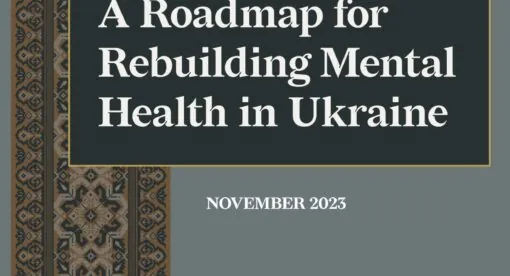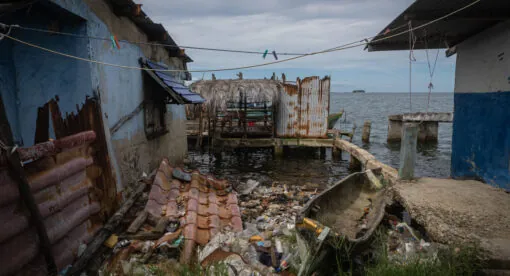The Weekly Forecast Monitor is a forward-looking assessment of geopolitical dynamics that are shaping the international system. To get more in-depth analysis of these issues and learn more about analytical products from New Lines Institute — including simulations, training sessions, and forecast reports — contact us at [email protected] and visit https://newlinesinstitute.org/analytical-products/. Download PDF version.
Global Hotspot Tracker
The Global Hotspot Tracker examines the outlook for key geopolitical hotspots around the world. (Go to the Global Connectivity Tracker)
Middle East/North Africa Regional Tensions
Summary – Tensions in the Middle East trended toward military and hybrid escalation scenarios, as Israel and Hamas remain unable to agree on the conditions of a cease-fire. Despite pressure from the U.S. and the international community and a U.N. Security Council resolution calling for an immediate cease-fire, Israel continues to consider a major ground offensive in Rafah. Israel and Hezbollah continue to exchange fire across the Lebanese/Israeli border.
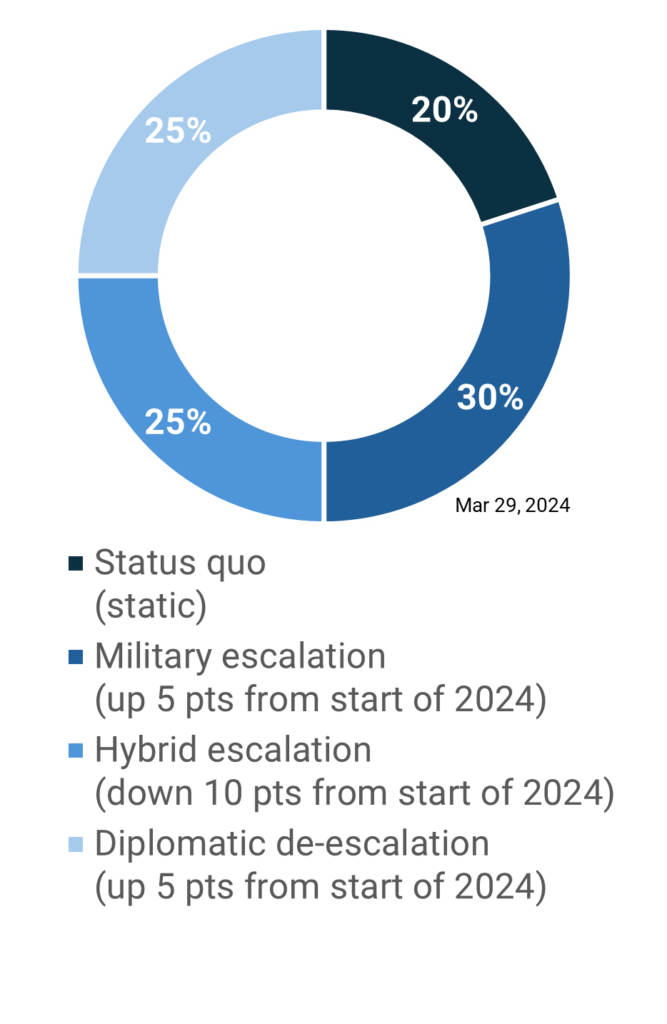
Military escalation scenario
- Israel targeted Rafah with multiple airstrikes this week, a possible sign that a Rafah ground offensive is nearing.
Risk level – medium - Tensions between Hezbollah and Israel continued to rise in what has become tit-for-tat rocket/missile exchanges.
Risk level – low/medium - Israel carried out multiple airstrikes in Syria’s Aleppo province on Friday, killing three dozen Syrian soldiers and at least five Hezbollah members
Risk level – low/medium
Hybrid escalation scenario
- Al-Houthi rebels targeted a Chinese-owned oil tanker, stating it was a U.S. ship. Although non-Western ships have been targeted in the past, the attack potentially marks a shift in strategy.
Risk level – medium
Diplomatic de-escalation scenario
- The U.N. Security Council passed a resolution calling for an immediate cease-fire in the Israel/Hamas conflict and the unconditional release of all hostages.
Opportunity level – low - Cease-fire negotiations continued at the start of the week before Israel recalled negotiators and Hamas rejected a “bridging” proposal made by the United States. Hamas is sticking with a proposal it made last week that requires a withdrawal of Israeli troops from Gaza. Negotiations appear to be stuck.
Risk level – low
Russia/Ukraine Conflict
Summary – The Russia-Ukraine conflict is trending toward military and hybrid escalation scenarios as Russia claimed Ukraine played a role in a terrorist attack in Moscow despite evidence pointing to the Islamic State. Russia continued to target energy infrastructure in Ukraine, while secondary sanctions have complicated transactions between Russian oil suppliers and banks in China, the United Arab Emirates, and Turkey. Russia conducted internal crackdowns against migrants from Central Asia.
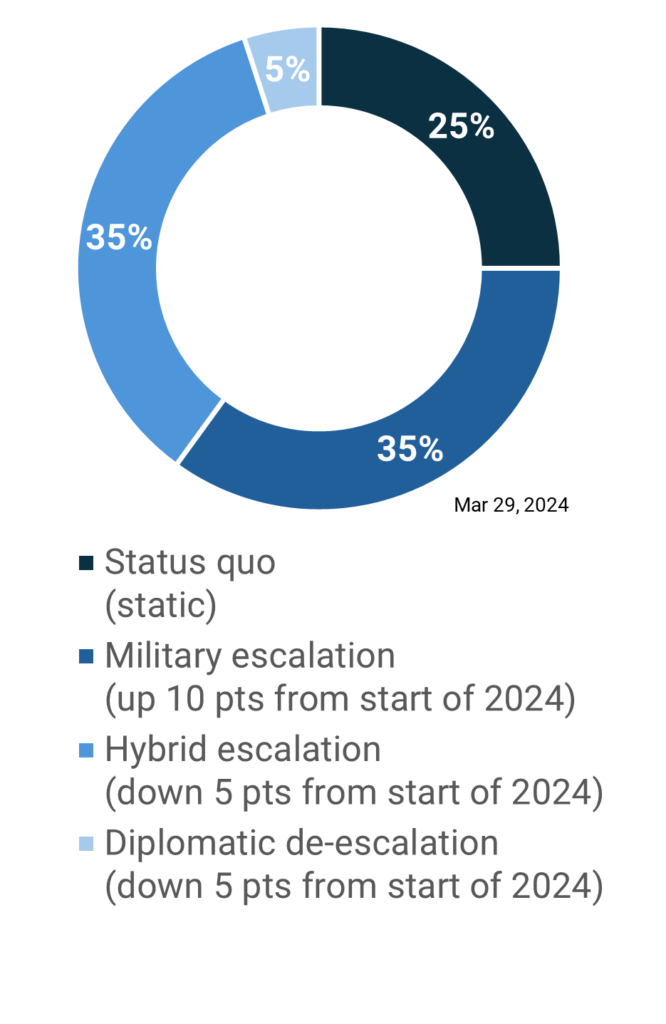
Military escalation scenario
- Russia blamed Ukraine for the March 22 attack on a concert hall in Moscow despite the Islamic State claiming responsibility and denials from Kyiv and the U.S. of any Ukrainian culpability.
Risk level – low - Russian forces made marginal territorial gains in eastern Ukraine near Bakhmut in the Donetsk region and hit Kharkiv with airstrikes for the first time since 2022.
Risk level – low - Ukraine attacked Russia’s Belgorod region and targeted naval assets and a communications center in Crimea.
Risk level – low - Russia said while it had no plans to attack any NATO countries, it would target F-16 fighter jets supplied by NATO members if they are deployed in Ukraine.
Risk level – low
Hybrid escalation scenario
- Russia attacked an underground natural gas storage site in Ukraine, while Ukrainian energy company DTEK reported losing 50% of its generating capacity after Russia struck its energy system.
Risk level – medium - Russian oil companies are facing delays in payments for exports as banks in China, the UAE, and Turkey are becoming more cautious due to the potential impact of U.S. secondary sanctions.
Risk level – medium - Russia’s Mir payment system will not be available for use on Samsung’s mobile payment service as of April 3, according to the South Korean company, while the Union of Banks of Armenia announced it would stop servicing Mir cards as of March 30.
Risk level – low - Ukraine’s security service detained two Ukrainian citizens accused of helping Russia’s FSB plot attacks against communications and transport infrastructure in Ukraine.
Risk level – low
Diplomatic de-escalation scenario
- Ukraine’s foreign minister visited India to promote Kyiv’s peace formula.
Opportunity level – low
China/Taiwan/U.S. Tensions
Summary – U.S., Taiwan, and China tensions continued to trend toward military and hybrid escalation scenarios. China filed a complaint with the World Trade Organization against U.S. subsidy programs for electric vehicles and announced the phasing out of U.S.-made microprocessors in government systems. The U.S. and U.K. filed charges and imposed sanctions against Chinese citizens accused of conducting a widespread hacking campaign. The U.S. approved $300 million in military funding to Taiwan, as the island announced plans to improve its combat effectiveness. Tensions between the Philippines and China remain high after the Chinese coast guard used water cannons against a civilian vessel. The U.S. and Japan plan to announce closer military cooperation in the coming weeks.
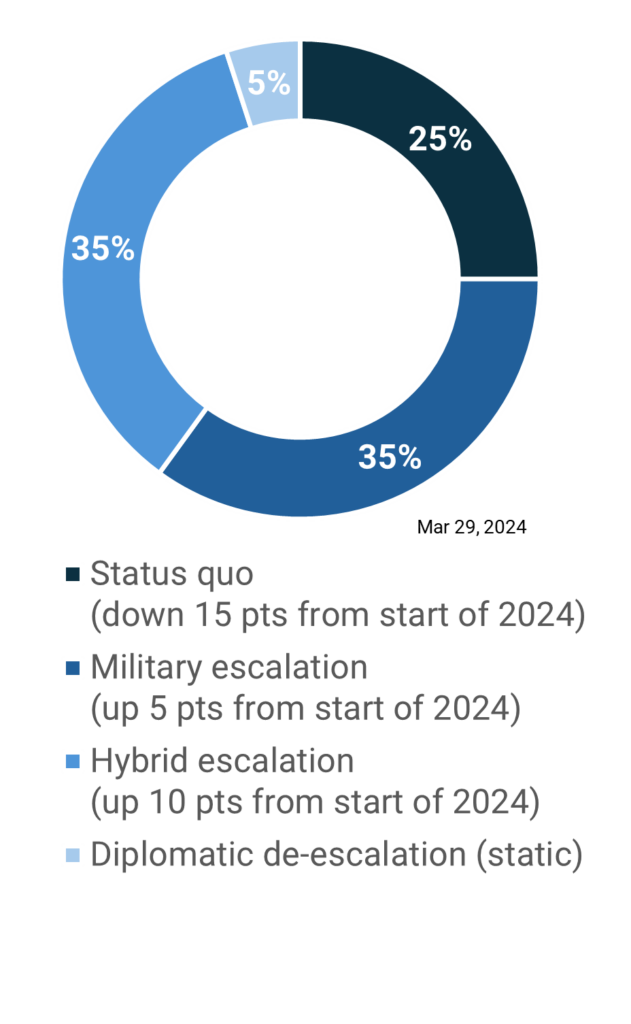
Military escalation scenario
- The Chinese coast guard used water cannons against a civilian vessel that was resupplying Filipino troops in disputed South China Sea waters.
Risk level – low/medium - On April 10, Japanese Prime Minister Fumio Kishida and U.S. President Joe Biden plan to meet at the White House for an expected announcement of closer military cooperation, including the potential for Washington to appoint a four-star commander to oversee U.S. forces in Japan.
Risk level – low - The U.S. approved $300 million in military funding for Taiwan with a spending bill that also prohibits Department of Defense maps depicting Taiwan as part of China.
Risk level – low - Taiwan announced plans to build a maintenance center for anti-ship missiles, including Taiwan-made Hsiung Fengs and U.S.-made Harpoons, a move that would improve Taiwan’s combat effectiveness.
Risk level – low
Hybrid escalation scenario
- In a complaint filed with the World Trade Organization, China accused the U.S. electric vehicle subsidies program of “severely distorting” fair competition.
Risk level – medium - China will require microprocessors from U.S. firms Intel and AMD to be phased out of use in Chinese government computers and servers.
Risk level – low - The U.S., U.K., and New Zealand accused Chinese-backed hackers of breaching government networks. The U.S. and U.K. filed criminal charges and imposed sanctions against the alleged hacker.
Risk level – medium
Diplomatic de-escalation scenario
- No major indicators.
Global Connectivity Tracker
The Global Connectivity Tracker examines the impact of geopolitical dynamics on global energy security and the climate transition. (Go to the Global Hotspot Tracker)
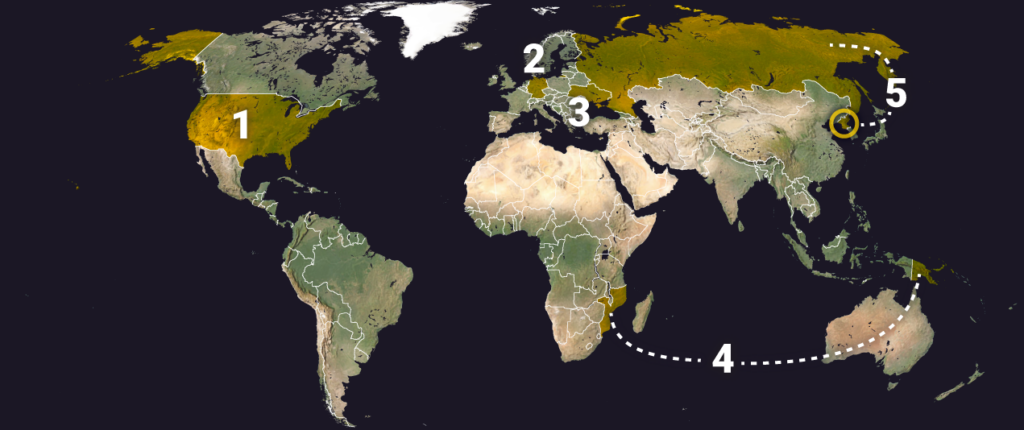
Energy/Climate
- United States
What happened: The attorneys general of 16 U.S. states have sued the federal government seeking to reverse the January decision by President Joe Biden to pause the permitting process for new LNG exports.
Significance/Outlook: In response to climate activist pressure, Biden paused export authorizations to key Asian and European nations so the government could investigate the growing LNG industry’s potential environmental and economic effects. Republican-led Texas, Louisiana, and Florida, among other parties in the lawsuit, said that suspending new LNG export permits will hurt the U.S. economy, disrupt gas supplies to European allies attempting to diversify away from Russian gas, and threaten billions of dollars in investments. Apart from economic and market concerns, this pause will help in the assessment of LNG’s environmental footprint, specifically the claim that greenhouse gas emissions from U.S. LNG production could exceed those of coal.
Risk level – low - Germany
What happened: Seven lignite-fired power plant units with 3.1 gigawatts of generating capacity will close in Germany at the end of March.
Significance/Outlook: As lithium-ion batteries are the future of transportation and energy storage, increasing the supply of lithium is of the utmost importance for a clean energy transition, and local production of lithium is important to the economy and national security of the United States. Currently, the U.S. imports most of its critical energy transition minerals (copper, lithium, nickel, cobalt). China supplies the majority of the U.S.’s lithium-ion batteries. The largest lithium reserves in North America, in Nevada, will be used to build a lithium processing facility to boost U.S. lithium production and reduce dependency on China.
Opportunity level – low
- Ukraine
What happened: The largest private energy business in Ukraine, DTEK, claimed the loss of 50% of its generating capacity as a result of a major Russian strike on the country’s energy system.
Significance/Outlook: Eight Russian missiles inflicted significant damage on Ukraine’s largest hydroelectric power plant, the Dnipro, in the most severe energy infrastructure attack since the invasion. Recovery from the attack, which severely damaged the company’s generation and distribution systems, will take months, with the full extent of the damage and necessary repairs still being assessed. The attack targeted distribution network nodes, transformers, and other components, degrading not only generation capacity but also the Ukrainian grid’s capacity to transmit electricity.
Risk level – medium - Mozambique/ Papua New Guinea
What happened: French bank Agricole decided to stop financing the Rovuma LNG and Papua LNG projects in Mozambique and Papua New Guinea.
Significance/Outlook: This decision aligns with net-zero commitments by Agricole, which plans to boost its exposure to renewable sources of energy by 80% in the coming years. This is a natural shift from European banks, which have been under pressure to move away from any type of fossil-fuel investments. Agricole’s decision will strongly affect the two countries, which have economic incentives to develop their natural gas extraction industries. Looking forward, there is a great potential for geothermal, solar, and hydropower energy development in both countries, and investment flows from Europe could increase in their renewables sector.
Risk level – low - Russia/North Korea
What happened: Russia has started supplying oil directly to North Korea in return for the transfer of munitions and missiles, and the U.S. and South Korea are concerned.
Significance/Outlook: On March 7, satellite images depicted North Korean tankers loading oil at Russia’s Far East port. Continued U.N. sanctions against the two countries are bringing them together as they find alternative ways to boost their economies. In March alone, at least five North Korean tankers traveled to load petroleum products, marking the first documented direct seaborne shipments of oil from Russia to North Korea since 2017. In response, the United States and South Korea launched a new task force to prevent North Korea from acquiring Russian oil. They are discussing means and mechanisms of enforcing the sanctions, fearing that the shipments will strengthen North Korea’s military posture and nuclear development while allowing Russia to skirt sanctions against its oil exports.
Risk level – medium
Key Stats of the Week
Ukrainian electricity generation by fuel source (2023)
- Nuclear power: 62%
- Coal: 15%.
- Renewables: 15%
- Other fuels: 8%
Source: https://www.statista.com/statistics/1237676/ukraine-distribution-of-electricity-production-by-source/



